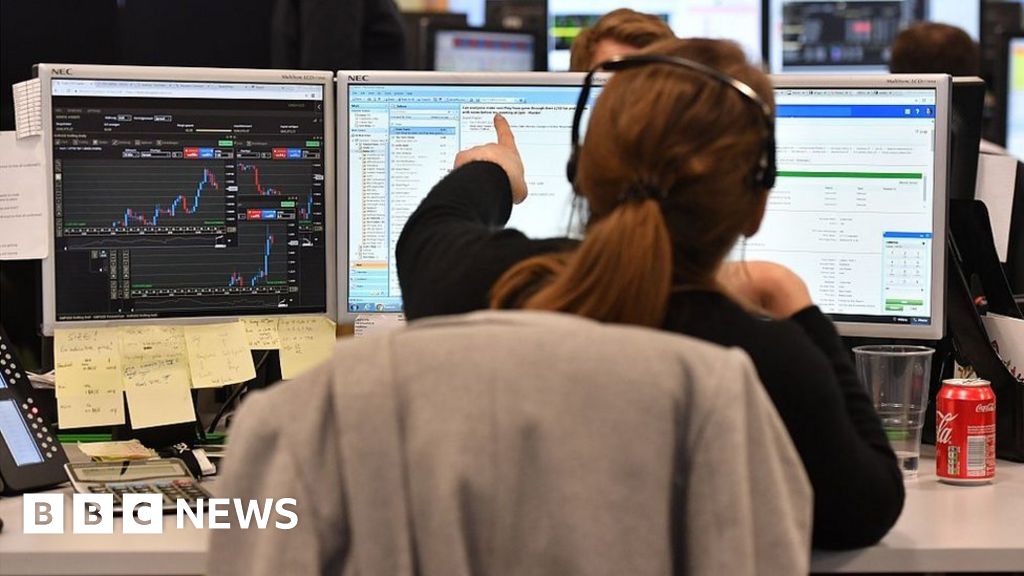Image source, Getty Images
Amsterdam ousted London as the largest financial trading centre in Europe last month as Brexit-related changes to finance rules came into force.
About €9.2bn (£8.1bn) worth of shares were traded on Amsterdam exchanges each day, against €8.6bn in London.
Following new Brexit rules, EU-based banks wanting to buy European shares currently cannot trade via London, meaning a loss of fees for City firms.
Bank of England chief Andrew Bailey has warned the EU not to cut off London.
On Wednesday, Mr Bailey said there were signs that the EU planned to cut the UK off from its financial markets.
Following the new Brexit trading rules coming into effect, there are talks to harmonise rules over financial regulations – so-called equivalence
Both sides are working towards a March deadline to agree an “equivalence” regime under which the UK and Europe would recognise the other’s regulations.
Number 10, said it remained “open” to discussions with the EU on the equivalence issue.
“Despite the fact that we’ve supplied all of the necessary paperwork and are one of the world’s most preeminent financial centres, with a strong regulatory system, the EU still haven’t granted us full equivalence.”
“This has meant that some EU shares that were previously traded on UK venues have moved to the EU venues on advice of the European regulator, but our position is fragmentation of share trading across financial centres is in no one’s interest,” it added.
It’s called invisible trade – but selling services abroad is something the UK excels in, particularly when it comes to banking.
Financial services makes up about 7% of the UK’s income in total, and about 40% of banking and investment’s business abroad is with the EU.
But its needs were largely invisible from the deal struck with the EU at the end of last year. The diversion of share trading is the first visible, if inevitable, sign of the impact.
And that business may not return to London. Even if the UK government and Brussels can ultimately reach agreement that financial services can get more access to each others markets, on the basis the UK’s standards can be deemed “equivalent” to the EU’s, share dealing may not be part of that.
The UK government hopes Brexit will enhance the City’s dominance, with scope to deepen relationships with other financial centres. But that’s a work in progress.
The boss of one share exchange described a recently-struck deal that allows Swiss shares to be traded in London as being like a free kick in a football match rather than an equaliser: it doesn’t compensate for what has been lost in loosening ties with Europe.
Lost income
Mr Bailey said the City wanted to reach an agreement on financial rules, but would not accept being “dictated” to by Brussels. He said EU demands had so far been unreasonable.
“I’m afraid a world in which the EU dictates and determines which rules and standards we have in the UK isn’t going to work,” the governor said in his annual Mansion House speech to the City, this year held virtually.
“Is the EU going to cut the UK off from itself? There are signs of an intention to do so at the moment but I think that would be a mistake,” he added.
“We have to state the argument for global standards and markets and openness and if we all sign up to that then there’s no need to go in that direction.”
Financial services – a key driver of the UK economy – were largely omitted from the last-minute Brexit trade deal agreed in December.
The City generates about £135bn in business annually, with financial institutions earning big fees from trading stocks and shares. But London’s financial centre has been cut off from EU markets since 1 January.
But Brussels says it will not be rushed into decisions on granting access for UK financial firms, as it wants to see how far UK rules will diverge from its own.
It follows fears the UK will adopt a low-regulation Singapore-style model that would undercut the EU.
Image source, Getty Images
Mr Bailey said the EU was holding the UK to unrealistically high standards on the issue of divergence, saying it would in effect make the City a “rule taker”.
He added that while some UK rules would change post-Brexit, sudden deregulation was not on the cards.
“Let me be clear, none of this means that the UK should or will create a low-regulation, high-risk, anything-goes financial centre and system,” he said.
“We have an overwhelming body of evidence that such an approach is not in our own interests, let alone anyone else’s.”
Despite the current situation, Mr Bailey said that London would “undoubtedly continue as one of the world’s leading if not the leading financial centre”.
Last month Mr Bailey said up to 7,000 finance jobs had so far been relocated from London to rival centres in the EU – well down on predictions of as many as 50,000 losses.

